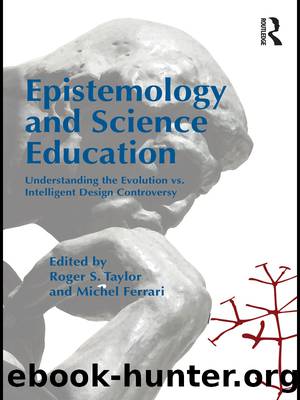Epistemology and Science Education by Taylor Roger S.;Ferrari Michel;

Author:Taylor, Roger S.;Ferrari, Michel;
Language: eng
Format: epub
Tags: ebook
Publisher: Taylor & Francis Group
Published: 2011-09-25T00:00:00+00:00
Acknowledgments
The material on evolution is based, in part, upon studies supported by the National Science Foundation with grants to: Evans (PI) & Rosengren (#0411406), Diamond (PI), University of Nebraska State Museum of Natural History (#0229294), and to Weiss (PI), New York Hall of Science, & Evans (#0540152).
References
Aries, P. (1974). Western attitudes towards death: From the middle ages to the present. Baltimore, MD: Johns Hopkins University Press.
Ashforth, A. (2001). An epidemic of witchcraft? The implications of AIDS for the post-apartheid state. In H. Moore & T. Sanders (Eds.), Magical interpretation, material realities (pp. 184-225). London: Routledge.
Ashforth, A. (2005). Witchcraft, violence, and democracy in South Africa. Chicago, IL: University of Chicago Press.
Astuti, R., & Harris, P. L. (2008). Understanding mortality and the life of the ancestors in rural Madagascar. Cognitive Science: A Multidisciplinary Journal, 32, 713-740.
Astuti, R., Solomon, G. E. A., & Carey, S. (2004). Constraints on conceptual development: A case study of the acquisition of folk biological and folk sociological knowledge in Madagascar. Monographs of the Society for Research in Child Development, 69 (3. Serial No. 277).
Atran, S. (2002). In gods we trust: The evolutionary landscape of religion. New York: Oxford University Press.
Atran, S., & Sperber, D. (1991). Learning without teaching: Its place in culture. In L. Landsman (Ed.), Culture, schooling, and psychological development (pp. 39-55). Norwood, NJ: Ablex.
Biema, D. V. (2006, November 13). God vs. Science. Time, 168, 48-55.
Boyer, P. (1993). The naturalness of religious ideas: Outline of a cognitive theory of religion. Los Angeles/Berkeley, CA: University of California Press.
Brandt, A., & Rozin, P. (Eds.). (1997). Morality and health. New York: Routledge.
Brem, S. K., Ranney, M., & Schindel, J. (2003). Perceived consequences of evolution: College students perceive negative personal and social impact in evolutionary theory. Science Education, 87, 181-206.
Campbell, J. (1972). Myths to live by. New York: Viking Penguin, Inc.
Carey, S. (1985). Conceptual change in childhood. Cambridge. MA: MIT Press.
Carey, S. (2000). Science education as conceptual change. Journal of Applied Developmental Psychology, 21, 13-19.
Catley, K. M. (2006). Darwinâs missing linkâA novel paradigm for evolution education. Science Education, 90, 767-783.
Dawkins, R. (1995). Putting away childish things. Skeptical Inquirer, 19(1), 31-36.
Diamond, J., & Evans, E. M. (2007). Museums teach evolution. Evolution, 61(6), 1500-1506.
Diamond, J., & Scotchmoor, J. (2006). Exhibiting evolution. Museums and Social Issues, 1, 21-48.
Doolittle, W. (2000). Uprooting the tree of life. Scientific American, 282(2), 90-95.
Doyle, R. (2003, March). Sizing up evangelicals: Fundamentalism persists but shows signs of moderation. Scientific American, 228, 37.
Evans, E. M. (1994/95). God or Darwin? The development of beliefs about the origin of species. Dissertation Abstracts International Section A: Humanities & Social Sciences; Vol. 558-A Feb 1995 2335 AAM9500920: University of Michigan.
Evans, E. M. (2000a). The emergence of beliefs about the origins of species in school-age children. Merrill-Palmer Quarterly: A Journal of Developmental Psychology, 46, 221-254.
Evans, E. M. (2000b). Beyond Scopes: Why creationism is here to stay. In K. Rosengren, C. Johnson, & P. Harris (Eds.), Imagining the impossible: Magical, scientific and religious thinking in children (pp. 305-331). Cambridge, UK: Cambridge University Press.
Evans, E. M. (2001). Cognitive and contextual factors in the emergence of diverse belief systems: Creation versus evolution.
Download
This site does not store any files on its server. We only index and link to content provided by other sites. Please contact the content providers to delete copyright contents if any and email us, we'll remove relevant links or contents immediately.
The Art of Coaching Workbook by Elena Aguilar(51160)
Trainspotting by Irvine Welsh(21641)
The Secret History by Donna Tartt(19052)
Twilight of the Idols With the Antichrist and Ecce Homo by Friedrich Nietzsche(18621)
All the Missing Girls by Megan Miranda(15950)
Cat's cradle by Kurt Vonnegut(15334)
Ready Player One by Cline Ernest(14639)
Talking to Strangers by Malcolm Gladwell(13346)
Fangirl by Rainbow Rowell(9228)
The remains of the day by Kazuo Ishiguro(8969)
The Compound Effect by Darren Hardy(8943)
Thirteen Reasons Why by Jay Asher(8893)
Tools of Titans by Timothy Ferriss(8365)
Periodization Training for Sports by Tudor Bompa(8253)
Wonder by R. J. Palacio(8097)
The Lover by Duras Marguerite(7893)
A Court of Wings and Ruin by Sarah J. Maas(7817)
Change Your Questions, Change Your Life by Marilee Adams(7758)
The Complete Stick Figure Physics Tutorials by Allen Sarah(7363)
